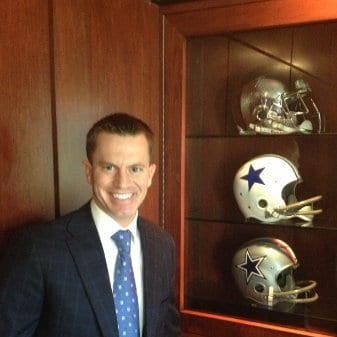by Kirk Wakefield – November 2016
If we, will you?
In 2003, the Baylor Sports Sponsorship & Sales (S3) program began the day we walked into the San Antonio Spurs offices and asked Russ Bookbinder, “If we did this, would you help?”
Darryl Lehnus and I then set out to every other team in Texas asking the same question, getting feedback, making adjustments and gaining support to launch the program in 2004 with the first graduating class in 2006. Students will get a kick out of watching the original S3 promo video. The keys, then and now, to make academic and professional partnerships work are simple:
| Steps to Build Partnerships | Ask/Offer |
| Identify the unique need. | What is your biggest need? |
| Identify competition. | How is this need addressed now? |
| Ask for commitment. | If we, will you? |
| Ask for referrals. | Who else might be interested? |
| Develop relationships. | How can we improve? |
We keep asking these questions to maintain position and relevance. In the beginning, and in adding the CRM & Analytics track (2011) to the major, we did not accept more students than industry commitments to help with placement.
Today, with over 210 S3 Alumni, many reaching management and executive levels, our vision is the same: to instill integrity in the business of sports & entertainment. Integrity starts with delivering on what we promise to students and employers. And listening. And learning. A lot.
Listen. Learn. Launch.
Board members began asking for more recruits. Board members moved to new teams, which usually means adding another team to the board. We saw the opportunity to grow, but at the same time maintain Baylor’s goal to keep classes under 20 students. So, in the past three years, the number of qualified students admitted to the S3 major doubled from the original 19 to 38 as we increased the number of sections for each class. We launch a new Sports Sales Management course Spring 2017, with board member Bill Glenn, leading the class. More changes are in the works for the CRM & Analytics graduate program, as we launch a global partnership in the United Kingdom.
For the first 12 years (2004-2016), recruitment was combined with the S3 Board Meeting. The S3 Pro Day was launched based on feedback from board members Alan Aldwell (Pittsburgh Pirates) and Rob Erwin (Dallas Mavericks), among others. After asking others for input, with the support of Patrick Ryan & Eventellect, we launched the first ever S3 event dedicated entirely to recruitment. We moved the S3 Board Meeting to a different date (January 17-18, click here for more information), focused on best practices and developing mentor relationships for career-long impact. We will keep listening and learning.
In the process, we also developed an interview scorecard to help both students and recruiters focus on the values and skills important to us. Feel free to edit and adjust for your own use in developing or recruiting talent. Click here to review and download.
Eventellect S3 Pro Day in Pictures
Thanks to the recruiters from the teams, companies, and leagues that participated in the Eventellect S3 Pro Day!
Here are the S3 Senior Pro Days in pictures.
Night at Vitek’s
[slideshow_deploy id=’9551′]
Ticket Sales Interviews
[slideshow_deploy id=’9586′]
Partnerships and CRM & Analytics Interviews
[slideshow_deploy id=’9612′]












